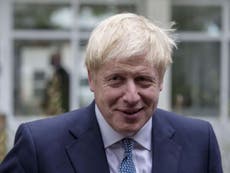‘Living within our means’ – or having the means at all – is Boris Johnson’s willing sacrifice at the Brexit altar
Johnson’s promised tax cuts or a no-deal Brexit would undo much of the decade-long drive to reduce national indebtedness

Is high government debt a) irresponsible (to quote David Cameron), or b) nothing to worry about?
If you are our brand new prime minister, you’ll have two answers: it’s “a” if you have the opportunity to make the poorer half of Britain’s population even poorer, but “b” if you have the opportunity to make the better off, well, better off.
And there is a third answer: if the sacred prize of Brexit is at stake, national debt becomes irrelevant, a mere footnote. As, to be fair, does everything else.
The same Boris Johnson who has consistently supported his party’s austerity programme is now in a position to make good on campaign promises that would unwind about half the effort to cut spending over the past decade “in a stroke”.
That is the assessment of Bloomberg economist Jamie Murray who told BBC Radio 5 Live that Johnson’s spending pledges would cost over £20bn a year – mostly due to planned cuts to income tax and national insurance contributions – while a no-deal Brexit would add another £30bn in yearly costs because of weaker economic growth and lower tax revenue.
The extra expenses would increase both the budget deficit – the debt-funded gap between current public revenue and spending – and overall national debt.
A closer look at the numbers confirms Murray’s analysis. In 2010 when the austerity drive started, Britain’s budget deficit stood at £142.6bn. Last year, it was down to £30bn, a reduction of £112.6bn. The £50bn-plus cost of Johnson’s plans is indeed about half of that amount.
The extent of the “unwinding” is even more stark if you compare the £50bn with the more than £40bn of cuts to day-to-day spending on public services since 2010. Then it looks less like two steps forward, one step back and more like a complete reversal.
But that’s OK, right? Because, you know, the ends justify the means. Especially if the end is Brexit, on 31 October, “do or die”, and/or the tax changes that would benefit high earners.
Back when a Johnson premiership was just a terrifying possibility rather than a dystopian reality, he promised to raise the threshold at which the higher rate of income tax kicks in from £50,000 to £80,000. The Institute for Fiscal Studies (IFS) calculated that such measure would cost about £9bn a year.
Johnson also pledged to take more people out of paying national insurance, by lifting the level of earnings at which they become payable. He did not say what the new threshold would be, nor whether the reform would apply just to contributions by workers or to those by employers too.
The IFS had to make some assumptions and concluded that the policy would cost between £11bn and £17bn a year and, although it would help low earners, it would help people on upper-middle incomes more.
Contrast that with the effects of the austerity programme. Research published by the Equalities and Human Rights Commission found that the tax and welfare reforms introduced between 2010 and 2017 have hurt lower-earning households much more than higher-earning ones, with the disabled and families with children particularly badly hit.
Since becoming prime minister, Johnson has made additional financial commitments. He has promised to hire an extra 20,000 police officers, which would simply reverse the cuts since 2010 and, according to Bloomberg’s Murray, cost a relatively small £600m.
On Saturday, Johnson also pledged to give towns £3.6bn to invest in transport and broadband. That, again, is a much smaller amount than the £20bn-plus required for slashing taxes and it will do nothing to plug the looming £8bn hole in the funding for local services.
I can foresee two possible objections from Johnson’s supporters. One is: neither the budget deficit nor our (historically very high) level of national debt have to rise for him to deliver on his fiscal promises, because the extra spending would come out of our “fiscal headroom”. But, as Paul Johnson of the IFS was first to explain, the headroom is merely an arbitrary leeway to borrow more – namely, £26.6bn more.
From September, new treatment of student loans will remove about half of that headroom and widen the budget deficit significantly. What’s more, the headroom is there only for one year, whereas tax cuts will need to be funded permanently.
The second likely objection is that Johnson’s proposed tax cuts would pay for themselves by boosting economic growth and hence tax revenue. Not so fast. Research published by the National Institute of Social and Economic Research last week showed that higher spending by more lightly taxed workers would have only a small positive impact on GDP and the deficit.
A no-deal Brexit, more likely now that Johnson is in charge, would have the opposite effect, and to a dramatically greater extent. The Office for Budget Responsibility, the government’s spending watchdog, has forecast that the economy would fall into recession and, starting from next year, the annual budget deficit would balloon by around £30bn.
But we’d better not complain. These days fiscal responsibility, or perhaps even any kind of economic sense, are so, well… unpatriotic.





Join our commenting forum
Join thought-provoking conversations, follow other Independent readers and see their replies